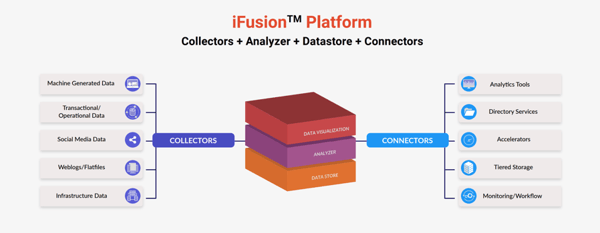
The rise of data and how organizations are increasingly becoming data driven
With huge amounts of data being generated every second from various sources such as business transactions, industrial machinery and social media, data is becoming the fuel that is driving any business. Organizations are relying on data and analytics to run every aspect of their business ranging from optimizing business processes and improving productivity to acquiring customers and creating new products.
By 2022, 90% of corporate strategies will explicitly mention information as a critical enterprise asset and analytics as an essential competency. - Gartner
While data has become an invaluable resource for modern businesses, the process of unlocking the power from all this available data to gain valuable business insights comes with its own implementation challenges.
Major challenges encountered while building data and analytics solutions
- Sheer volume and different types of data collected
With data coming in from multiple sources, the process of collecting, aggregating, and managing it becomes extremely challenging. Different data sources may store data in different ways - files, web APIs, databases, CRM systems, using different data formats – structured, unstructured, and semi structured. Since every data source is different, there arises the need to develop capabilities to connect to each data source and integrate it with larger ETL workflow, which is technically demanding and time consuming. - Increasing storage costs
With the data volumes growing from gigabytes to terabytes and petabytes, the online storage costs also grow steeply high. The physical infrastructure and operational costs to maintain this ever-growing lake of data, online and immediately available for analysis, is becoming a burden on both in-house datacentres and cloud-based environments. The challenge here for organizations is to strike a balance between accessing the data on demand with minimal latency and minimising the overall storage cost. - Security risks
Data security is a given risk across organizations of all sizes. The security challenges are multi-faceted such as data tampering, unauthorized access, falsifying user identities, non-compliance with regulations etc. making it complex for organizations to ensure that security measures are intact across the spectrum of data lifecycle. A single data security breach can make companies vulnerable to loss of competitive information, identity theft, financial losses, legal issues, reputational damage etc., making security a major challenge that needs to be handled efficiently. - Lack of processes
When data is extracted from disparate databases, data inconsistency is an inevitable result. Additionally, the data continuously need to be compared with existing data and be monitored for changes to ensure accuracy, completeness, and consistency over the entire life cycle. Lack of defined processes, data management systems and substandard data strategies contribute towards inaccurate data. - Development time and complexity
Data analysis involves lengthy and complex process of collecting the data, preparing the data, classifying the data, picking an algorithm to train a data model and finally preparing a model for prediction. If everything has to be done manually by data scientists, then the chances of error and the time needed for developing a solution would be very high leading to slower go-to-market. Moreover, there is a significant shortage of data scientists in the industry leaving organizations at a competitive disadvantage in the digital economy.
The need for full lifecycle data management platform for building data and analytics solutions
As organizations are predominantly becoming data-centric in nature, they realize the importance of having quality data to gain rich insights and employing a sophisticated approach to manage data. Businesses typically require swift response and a short time-to-market with changing business requirements. However, as listed above, the process of data and analytics solutions implementation comes with its own set of complexities leading to increased time and cost of development. Therefore, organizations need to employ a full lifecycle data management platform that would do the technical and operational heavy lifting and allow businesses to focus on the core business logic.
How iFusionTM platform can solve data and analytics challenges and accelerate go to market of business focused solutions
Starting from data collection to data usage to archival, iFusionTM has various tools and components that enrich the life of data analysts and scientists.

The iFusionTM platform has ability to collect multi-source, poly-structured data with 25+ data collectors available out of the box. With its federated data store architecture, query engine and data virtualization layer, iFusionTM provides a unified view and access of data across the stores without unnecessary copying/duplication of data. It delivers maximum value at minimal cost with its intelligent archival and 2-tier storage architecture by moving data older than a specific period to low-cost archival storage yet providing uniform access to it.
iFusionTM platform comes with a Data Science Workbench (DSW) with 30+ out of the box data preparation and advanced machine learning algorithms that can be accessed through web browser. The DSW eliminates coding and eases the entire process of data analysis implementation for data analysts and scientists, saving up to 60% of their time. The platform comes with a job sequencer and scheduler to automate the flow of jobs and brings efficiency to the system.
iFusionTM platform ensures strict governance of data with features for role-based access, audit trail, data immutability, change data capture, and encryption along with a metadata repository server, ensuring that data is in line with enterprise governance, security, and audit requirements and maintains consistency of data. The platform connects with external systems to deliver specific functionality such as directory services for authentication, third party analytics and monitoring tools, and communication mechanisms.
The platform also comes with integrated solutions across verticals - Finance, Ecommerce, Healthcare, Telecommunications, Manufacturing, Oil and Gas, Security, and others, making integrated Big Data as a Service (IBDaas) a reality.